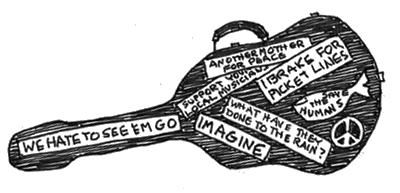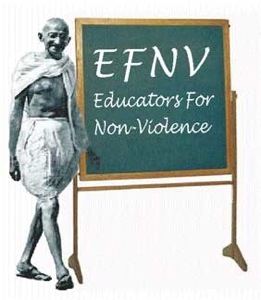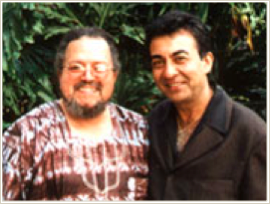


Malvina
was not a pacifist, but she was against imperialist wars like ours in
Vietnam; her parents had opposed the first World War for the same
reason. Here’s one of her anti-war songs:
PEACE ISN’T TREASON
Words and music by Malvina Reynolds; copyright 1965 Schroder Music Company, renewed 1993.
Chorus:
Peace isn't treason, Peace is good reason,
Peace is Heaven's will;
"Peace on earth!" is what He said,
And I believe it still.
Is our country then so weak
That it can only thrive
By bombing peasant villages
And burning babes alive,
Burning babes alive?
That it can only thrive
By bombing peasant villages
And burning babes alive,
Burning babes alive?
(Chorus)
Rich we are in everything,
Rich and strong and proud,
For our kings, the GNP,
For our sons, the shroud,
For our sons, the shroud.
Rich and strong and proud,
For our kings, the GNP,
For our sons, the shroud,
For our sons, the shroud.
(Chorus)
Wars there have always been,
We walk the same old way,
We walk the road our father's went
When they have gone astray,
When they have gone astray.
We walk the same old way,
We walk the road our father's went
When they have gone astray,
When they have gone astray.
(Chorus)
When the voice of reason speaks,
Unreasoned voices rage,
And so we add another line
To history's bloody page,
History's bloody page.
Unreasoned voices rage,
And so we add another line
To history's bloody page,
History's bloody page.
(Chorus)
We must learn to live with peace
And take it as our friend,
We must learn to live with peace,
Or all the world will end,
All the world will end.
And take it as our friend,
We must learn to live with peace,
Or all the world will end,
All the world will end.
(Chorus)
Malvina
didn’t record this song, or put it in any of her songbooks, though it
did appear in Sing Out! and Broadside in 1965. If you want a lead sheet,
please send a stamped self-addressed envelope to Schroder Music
Company, 1639 Channing Way, Berkeley CA 94710.

I went to an amazing conference in Oakland Friday night and Saturday. It was the third annual conference of Educators for Nonviolence (EFNV)
and the second one I’ve attended. Two presentations stood out for me:
one by Azim Khamisa, a former investment banker. He told his story aided
by a short DVD. His only son, Tariq, a college student with a part-time
job, had been killed by a gang member while he was delivering a pizza
to a bogus address. The killer was one of three fourteen-year-olds led
by an eighteen-year-old who handed him the gun and told him to shoot.
After much meditation, Azim decided to switch careers and start the Tariq Khamisa Foundation to
work on ending teen violence. He approached Ples Felix, the killer’s
grandfather/guardian, to work with him. The two of them, one a Muslim
immigrant, one African-American, have presented together about
forgiveness and violence prevention to a half-million children, with
another 20 million being reached by their message through video
presentations.
The
other presenter who really drew me in was Jill Dalander Johnson, who
has been teaching Peace and Conflict Studies at a high school in Oakley
for five years. She started teaching English and literature courses
thirteen years ago, then jumped through a lot of hoops to get approval
to teach what the administration calls “Ethical Decision-making” but the
students know by its real name. The district just didn’t want a course
with “peace” in the name. (Is peace treason?) Her “Peace Heroes” unit
goes beyond the usual suspects to Jeanette Rankin and Medea Benjamin.
She referred us to peaceheroes.com,
where this month’s hero is U. Utah Phillips (1935-2008) “Wobbly,
Worker, Hobo, Folksinger, Peace Activist, Storyteller and Inspirational
Truthteller.” When Utah was asked to give a commencement address he said
"You are about to be told one more time that you are America's most
valuable natural resource. Have you seen what they do to valuable
natural resources?! Have you seen a strip mine? Have you seen a clear
cut in the forest? Have you seen a polluted river? Don't ever let them
call you a valuable natural resource! They're going to strip mine your
soul. They're going to clear cut your best thoughts for the sake of
profit unless you learn to resist."
One
of the presenters pointed out that Gandhi said a movement should be 10%
non-violent resistance and 90% constructive program. One of his
constructive programs was providing rooms full of spinning wheels that
farmers too poor to buy a spinning wheel could come to to spin their own
cotton instead of selling it to be shipped to England and made into
clothing that the farmer could not afford. The spinning was
constructive, meditative, and also communal. The presenter asked for
examples of constructive programs here, and we offered community
gardens, farmers’ markets, etc.
As
with all conferences, lunch and the coffee breaks were important times
for learning too. I didn't know anyone there, but people were open and
friendly. Since there were only about forty people, at the opening
sessions each day we went around saying our names, where we were from,
what we were doing—some amazing things. I met a UC Berkeley education
student who will be taking a songwriting course there this fall as part
of her preparation to teach elementary school with an emphasis on the
arts. I met a woman who teaches conflict resolution to kids from
elementary through high school, using basically the same activities,
including lots of role playing, which work for all. Ms. Johnson said one
way to get reluctant teens to role-play is to call it “debate” and
assign them to argue for the side they would rather argue against.
There
was a lot of talk about courage. Somebody, I think Michael Nagler,
founder of the Peace and Conflict Studies Program at UC Berkeley, talked
about Daniel Ellsberg
making the decision to release the Pentagon Papers. For weeks he asked
himself “What will happen to me?” and couldn’t make up his mind to do
it. One day he asked, “If I were willing to go to jail, what would I
do?” He immediately started copying the documents. According to Marlo
Thomas’ book The Right Words at the Right Time, Ellsberg
heard an inspiring speech by a draft resister who then calmly said he
was going to jail. Ellsberg is quoted in the book as saying “Randy
Kehler never thought his going to prison would end the war. If I hadn't
met Randy Kehler it wouldn't have occurred to me to copy those papers.
His actions spoke to me as no mere words would have done. He put the
right question in my mind at the right time.”
The EFNV folks will be putting a lot of the conference up on their website. I hope more people show up in person next year.
A local peace hero died here a week ago. Dona Spring,
my representative on the Berkeley City Council and across-the-street
neighbor, succumbed to complications of rheumatoid arthritis. She was
fifty-five, and had served several terms on city council from a
wheelchair. Dona got a lot of hate mail for her October 2001 council
resolution opposing the war in Afghanistan. She was a champion of the
underdog—both literally and figuratively. She and Claudia got to know
each other when Claudia was chair of the Berkeley Humane Commission, and
Dona was one of the two council members with the most interest in
animal welfare; she was also a staunch ally when Claudia was working
through her union to reform the punitive city policies on workers’
compensation.
©2008 by Nancy Schimmel
Ples
Felix and Azim Khamisa of the Tariq Khamisa Foundation, named after
Azim’s son, who was killed by Ples’ fourteen-year-old grandson. They are
trying together to stop teen violence.
Tuesday, July 22, 2008


LEARN TO RESIST






